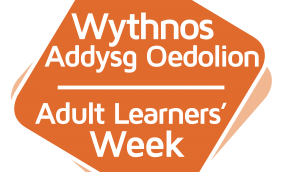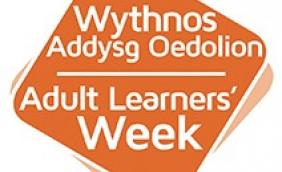This week we’re celebrating Adult Learners’ Week, the largest celebration of lifelong learning in Wales, with over 10,000 adults participating each year in a wide range of learning activities. This campaign is coordinated by the Learning and Work Institute in partnership with the Welsh Government and other key partners.
The aim of the campaign is to inspire more people to discover a passion for learning, while helping them develop valuable skills for work and life. Throughout Adult Learners’ Week, there will be hundreds of free and accessible courses, events, taster sessions, open days, and learning resources available to everyone.
Here we outline the significance of Adult and Community Learning to Wales, its vital role in supporting the Welsh economy and communities, as well as the ongoing challenges it faces.
Funding and participation
Adult education in Wales is at a critical juncture. The decline in adult learners, particularly in part-time further education (FE) and local authority community learning, is stark. Data from StatsWales shows a 45% drop in part-time learners in FE institutions, and a 49% decrease in local authority community learning over the past decade. This decline disproportionately affects those with the lowest qualifications, many of whom often seek basic skills in literacy, numeracy, and digital.
While numbers of full-time learners in FE since 2012/13 has been relatively stable, there are now nearly 50,000 fewer part-time learners in FE institutions than a decade ago - a decline of 45%.
This follows significant reductions in funding available for part-time provision in FE. Between 2011/12 and 2016/17 the revenue grant funding to the FE sector fell by £22 million, a reduction of 13% in real terms. Although funding for full time provision has risen by 3% in real terms, funding for part-time provision has seen a reduction of 71% over the same period.
Source: StatsWales, Unique learners enrolled at further eduaction in institutions
There has been a similar pattern of decline in participation in local authority community learning over the same period. Between 2012/13 and 2022/23, the number of learners has fallen by 49%. While 2022/23 has seen a significant recovery from the low point of Covid, there are still 16,000 fewer learners than just over a decade ago. In the majority of cases these will be learners with the fewest or lowest levels of qualifications and who are taking qualifications in literacy, numeracy and digital skills.
Source: StatsWales, Provider learners in local authority community learning by locall authority and provision type
The Role of Medr and Collaborative Solutions
Medr, the newly created Commission for Tertiary Education and Research, presents a unique opportunity for the sector to develop innovative solutions to improve adult education. ColegauCymru is establishing a new Adult Education Working Group, to generate ideas and solutions to foster a more collaborative and strategic approach to Adult Learning. The group will bring together expertise from across the sector to inform both the Welsh Government's and Medr’s priorities, and how we can create a culture of lifelong learning in Wales that ensures greater access and opportunities for all. The creation of Medr brings a new statutory duty to promote lifelong learning, aligning with the Welsh Government ambition to make Wales a “Second Chance Nation”. This provides a framework for consistent and durable action in adult education. Medr offers us a fresh opportunity to focus on several key areas to enhance Wales’ adult learning offer:
- Flexible Learning and Maximising Participation - Reviewing the planning and organisation of adult education to enhance flexibility and boost participation rates while balancing social and economic benefits.
- Basic Skills Acquisition - Developing a comprehensive plan to improve basic skills across the adult population.
- Data - Ensuring accurate, relevant, and timely data collection to better understand learner outcomes and improve educational provision.
- Credit Transfer and Recognition of Prior Learning - Exploring and addressing barriers to enabling credit transfer across the tertiary system to better facilitate learner progression.
Policy Drivers
Several long-term policy commitments and emerging reviews will shape the future of adult education in Wales. The Welsh Government aims to ensure that 75% of the working-age population holds at least a Level 3 qualification by 2050, alongside achieving one million Welsh speakers. Other important policy initiatives include the Net Zero Skills plan, the ongoing review of Adult Learning Policy, and the findings of the English for Speakers of Other Languages (ESOL) policy review. The upcoming conclusions from the Learning and Work Institute's review of local Adult Learning Partnerships will also have significant implications for the role of FE institutions.
The Link Between Education and Poverty
The relationship between poverty and poor educational outcomes are well-documented. Individuals with higher qualifications are less likely to be trapped in poverty, while those without qualifications are at a significantly higher risk. In fact, having no qualifications at all doubles working-age adults’ risk of experiencing very deep poverty. Education plays a central role in the pathway out of poverty, and adult learning is crucial in addressing social disadvantage. However, reduced funding for part-time provision has exacerbated this issue, highlighting the need for better support for adult learners.
In the pursuit of a more equal Wales, the role of adult education and community-based learning emerges as a linchpin in dismantling barriers, promoting inclusivity, and fostering social value.
This Adult Learners Week is an opportunity for Wales to acknowledge the transformative power of adult learning – its role in tackling poverty and inequality, and contributing to overall well-being and a sense of purpose. Wales has an opportunity now to create a robust system that offers greater opportunities for lifelong learning, ultimately contributing to a more inclusive and skilled society in Wales - for today’s and future generations.
Further information
ColegauCymru Website
Never Stop Learning - Adult Learners Week
Jamie Adair, Policy and Public Affairs Assistant
Jamie.Adair@ColegauCymru.ac.uk






